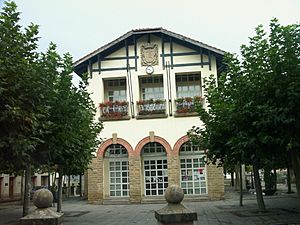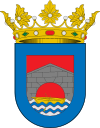Lapuebla de Labarca facts for kids
Quick facts for kids
Lapuebla de Labarca
|
||
|---|---|---|
 |
||
|
||
| Government | ||
| • Type | Mayor-Council | |
| Population
(2018)
|
||
| • Total | 857 | |
| Time zone | UTC+1 (CET) | |
| • Summer (DST) | UTC+2 (CEST) | |
| Postal code |
01306
|
|
| Official language(s) | Basque Spanish |
|
Lapuebla de Labarca is a small town and municipality in the Basque Country, northern Spain. It is located in the province of Álava.
Today, about 868 people live in Lapuebla de Labarca. The town is known for its farms and for making and selling special wine. This wine is called Denomination of Origin Rioja Alavesa.
Contents
What's in a Name?
Lapuebla de Labarca got its name from a boat. Long ago, there was a boat (a barca) here to cross the Ebro River. This boat helped people get from one side to the other.
Later, a suspension bridge was built, so the boat was no longer needed. The bridge used today is made of cement and was built in 1939.
A Look at History
Lapuebla de Labarca started because the nearby town of Laguardia needed a way to cross the Ebro River. This crossing connected the Kingdom of Navarre with Castile.
Lapuebla de Labarca is one of the newest towns in the Rioja Alavesa area. It was named after the boat used to cross the river. Later, a wire suspension bridge was built. The bridge used today was built in 1939.
At first, not many people lived here. In 1369, only five families paid taxes. But the town grew because of its good location, nice weather, and rich soil. In the 1600s, King Philip IV gave the town its independence from Laguardia. This happened on June 11, 1631.
The first part of Lapuebla de Labarca grew around the church. The main street in the old town forms a horseshoe shape near the church. From here, the town expanded. In the 1800s, it grew north to the "El Castillo" area. In the 1900s, it expanded west from "El Plano" square. The area with the wineries, called "Cuevas," is at the top of the village.
Today, Lapuebla de Labarca has about 868 people. It is a lively town focused on farming. Many businesses here are directly linked to making wine.
| 1897 | 1900 | 1910 | 1920 | 1930 | 1940 | 1950 | 1960 | 1970 | 1981 | 1991 | 2001 | 2006 | 2009 | 2015 |
|---|---|---|---|---|---|---|---|---|---|---|---|---|---|---|
| 770 | 810 | 811 | 800 | 865 | 886 | 899 | 829 | 774 | 763 | 814 | 852 | 860 | 877 | 861 |
Where is Lapuebla?
Lapuebla de Labarca is in the south of Álava. The Sierra de Cantabria mountains are to the north. The Ebro River is to the south.
The town sits on the southern hills of "Cerro de Misamayor." It is on a rocky area called "Los Riscos," almost hanging over the Ebro River. It is 429 meters (about 1,407 feet) above sea level. With only 6 square kilometers (about 2.3 square miles), it is the smallest municipality in Rioja Alavesa.
Weather and Seasons
Lapuebla de Labarca has four distinct seasons. Winters can be very cold. Summers are hot, with temperatures often between 28 and 35 degrees Celsius (82-95 degrees Fahrenheit). This warm weather is perfect for swimming in the village pools or having picnics by the Ebro River.
Spring and autumn have milder temperatures. These seasons are great for walks or bike rides around Lapuebla de Labarca.
The landscape changes with each season:
- In winter, the vineyards look "naked." You can see the chalky soil in straight lines.
- In spring (April, May, June, July), the vines turn a bright green.
- By late August and September, the green becomes darker. This is when grapes are picked.
- Autumn is especially beautiful. The land turns shades of ocher, yellow, and red. With blue skies, it looks amazing.
Autumn is a good time to visit. You can see grapes being picked and wine being made in the traditional way.
Fun Festivals
Lapuebla de Labarca has several fun festivals throughout the year:
- Day of the Open Cellar: This happens on the second Saturday of February. Wineries open their doors to the public. You can take guided tours, taste wines, and learn about winemaking. In 2011, over 4,000 people visited for this event.
- San Isidro Festival: On May 15, the town celebrates San Isidro, the patron saint of farmers. The PEÑA SAN BARTOLOME group organizes this festival.
- Saint Bartholomew's Day: Celebrated on August 24. The night before, young people carry a doll named Bartolo from the upper town to the City Council. They place Bartolo, the Basque flag (ikurriña), and a wine barrel (Cuba) on the balcony. Then, they set off a firecracker (txupinazo) to start the party! Bartolo watches over the celebrations from the balcony. On the last day, Bartolo is carried back in a "burial of the Cuba" ceremony. People often share zurracapote, a local drink. The running of the bulls is also famous here.
- La Poveda Pilgrimage: This is a traditional trip to La Poveda, a wooded area near the Ebro River. A special meal called sartenada is shared.
Famous People from Lapuebla
Some notable people were born in Lapuebla de Labarca:
- Pedro Córdoba Samaniego
- Salvador Velilla Córdoba: A writer and newspaper columnist.
- Theophilus Aguayo: A writer, priest, and historian known in the region.
- José María Pérez Medrano (1920-2008): A professional football player in the 1940s and 1950s. He played for Real Sociedad.
Local Legends
One legend from Lapuebla de Labarca is about the Virgin of Assa. This statue belonged to the Assa region, but it kept appearing in Lapuebla. The people of Assa would take her back, but she would mysteriously return to Lapuebla de Labarca again and again. Finally, the people of Assa decided to leave the Virgin in the church of Lapuebla. They believed she wanted to stay there.
See also
 In Spanish: Lapuebla de Labarca para niños
In Spanish: Lapuebla de Labarca para niños
 | Janet Taylor Pickett |
 | Synthia Saint James |
 | Howardena Pindell |
 | Faith Ringgold |


